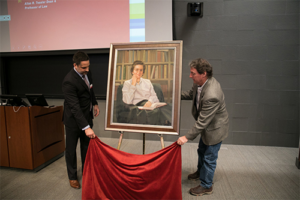This website uses cookies
We use cookies to ensure that we give you the best experience on our website. If you continue to use this site we will assume that you are happy with it.
“From this day forward, this beautiful lecture hall will be known as the Elizabeth Storey Landis Auditorium,” said Eduardo M. Peñalver, the Allan R. Tessler Dean and Professor of Law, on March 24. “It’s my pleasure and honor to ensure that the memory of this remarkable Cornell Law School alumna will live on for generations,” added Dean Peñalver as he dedicated a lecture hall in Myron Taylor Hall in honor of Landis.
 Elizabeth Storey Landis, who graduated from Cornell Law School in 1948, was a trailblazing woman lawyer who dedicated her life’s work to African law and independence. Landis also holds the distinction of being the third female law review editor in chief at the Law School, which was decades before any other law school generated even one. Throughout her career, Landis, who died in 2015, was a consistent supporter of the Law Annual Fund and made a bequest to Cornell Law School in her will.
Elizabeth Storey Landis, who graduated from Cornell Law School in 1948, was a trailblazing woman lawyer who dedicated her life’s work to African law and independence. Landis also holds the distinction of being the third female law review editor in chief at the Law School, which was decades before any other law school generated even one. Throughout her career, Landis, who died in 2015, was a consistent supporter of the Law Annual Fund and made a bequest to Cornell Law School in her will.
To mark the historic occasion, Peñalver unveiled a portrait to be hung in the auditorium, painted by Ithaca artist Bill Benson. Two of Landis’ nephews—Frank and Bill Landis—and their families attended the naming ceremony.
In spite of her qualifications, Landis faced a problem many women law school graduates encountered in the 1940s: She couldn’t find a job.
After earning a doctorate in law from the University of Lyon, France, however, Landis began working with a Cornell Law professor on a project to codify the laws of Liberia, which would lead to a lifelong commitment to modernize African law. In 1957, Landis was awarded the Liberian Humane Order of African Redemption for her work on the monumental project.
Before Landis began working with Milton Konvitz, a professor at Cornell Law School and the School of Industrial and Labor Relations, the laws of Liberia were kept in the offices of private attorneys, who charged citizens fees to view them. Not only were they inaccessible, not all copies of the laws agreed with one another, Peñalver said.
Landis’ job was to review the laws that Konvitz brought back from Liberia, devise a coherent legal structure for them, and draft new codes to submit to the Liberian legislature. After the legislature adopted the laws in 1956, Landis moved to Paris where her husband—William B. Landis, LL.B. ’49, whom she had met at Cornell—had been transferred by his New York law firm.
Landis became a professor of African studies at the American College in Paris and began to publish widely on law, human rights and Southern Africa. She was one of the earliest board members of the American Committee on Africa and later worked for the UN Council on Namibia and advocated for Namibia’s liberation.
The dedication ceremony for the Landis Auditorium was held in conjunction with Cornell Women’s Law Coalition Career Day and the Class of 2020 Admitted Student Day. The keynote speaker for the event was Leslie Richards-Yellen ’84, president of the National Association of Women Lawyers (NAWL).
“I can assure that for over 113 years, NAWL has been involved in efforts to push women towards gender equality,” said Richards-Yellen, director of Inclusion – Americas at Hogan Lovells in New York. “Through an avalanche of possibilities, brought on by sustained effort, I believe that we are on the brink of tremendous breakthroughs for women.”
The 2015 annual NAWL survey shows that women comprise 30 percent of law school deans, 24 percent of Fortune 500 general counsels, and 18 percent of law firm equity partners. Yet despite those numbers, Richards-Yellin said she believes there is growing recognition of the value women add to institutions, and she pointed to studies showing that companies with more women on their boards fare better economically.
Referring to Landis, Richards-Yellin challenged the students, faculty, and alumnae at the event to follow in Landis’ footsteps and help the career of a woman of another race, ethnicity, sexual orientation, or ability status. “What can you do to be more like Elizabeth Storey Landis?” she asked. “Will your efforts reverberate beyond the walls and the span of your lifetime?”